With US aid for Ukraine stalled, EU unlocks $55 billion in 'predictable funding'

- Oops!Something went wrong.Please try again later.
- Oops!Something went wrong.Please try again later.
- Oops!Something went wrong.Please try again later.
- Oops!Something went wrong.Please try again later.
European Union leaders approved a $55 billion support package for Ukraine on Thursday that the bloc's President Charles Michel described as "steadfast, long-term, predictable funding" for the country.
"We have a deal," Michel wrote on X.
The agreement follows months of delays caused by Hungarian Prime Minister Viktor Orbán, who had blocked the package, and as President Joe Biden's push to replenish wartime aid for Ukraine has stalled in Congress.
The deal locks in EU funding for Ukraine for four years.
Orbán has long been skeptical of EU policies on everything from immigration to LGBTQ+ rights, and he is Russian President Vladimir Putin's closest ally among EU leaders. He vetoed the package late last year.
As Russia's invasion of Ukraine nears its second anniversary at the end of the month, the country is running out of weapons and money to keep its economy and essential services afloat.
The money is expected to be used to pay pensions and salaries and to help keep weaponry flowing from Europe to Ukraine amid concerns that Russia is rapidly replenishing its domestic ammunitions production and cutting weapons deals with countries such as North Korea amid a stalemate on the front lines.
A passage to Putin: Kim Jong Un hops on his bulletproof, drab green train for Russia visit
Mykola Bielieskov, a research fellow at Ukraine's National Institute for Strategic Studies, said "everything" in the war will be decided by which country is able to resupply its weapons the fastest.
Still, Lyle Goldstein, an expert on Russia's military who teaches at Brown University and is also a fellow at Defense Priorities, a U.S. think tank, said that even if Ukraine manages to secures new funding and weapons, he believes Russia holds all the advantages militarily − in raw manpower, in the sophistication of its air force, and in a host of more advanced and powerful weaponry it has yet to commit to the field.
"A weapons system is unlikely to change the fundamentals, and that's proven true again and again," Goldstein said, referring to what he described as Ukraine's "failed" counteroffensive last year. It appeared to pick up steam as the U.S. and European countries provided Ukraine with tanks, missile systems and other weaponry.
Then it stalled.
On Wednesday, Russia and Ukraine said they exchanged about 200 prisoners of war each, bringing the total number of POWS repatriated on both sides to more than 3,000 since Russia invaded its neighbor.
The swap took place despite tensions resulting from a crash of a military transport plane last week that Russia claimed was carrying Ukrainian POWs and was shot down by Ukraine's forces.
This article originally appeared on USA TODAY: EU leaders unlock $55 billion in aid for Ukraine

